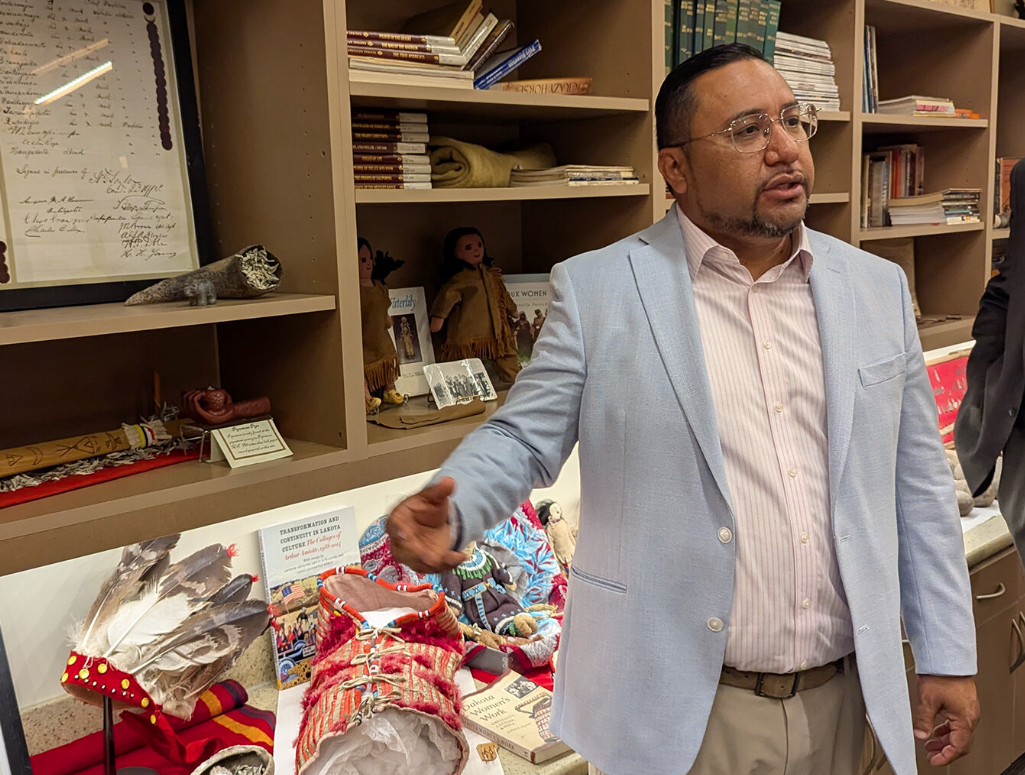
- Details
- By John Hult
Freshman Rep. Logan Manhart represents parts of Lake Traverse Reservation
AGENCY VILLAGE — The chairman of the Sisseton-Wahpeton Oyate said Thursday during a meeting of South Dakota’s State-Tribal Relations Committee that an earlier social media post from one of his district’s state representatives was “inflammatory” and “racially charged.”
[Editor's Note: This article was first published by South Dakota Searchlight. Used with permission. All rights reserved.]
Chairman J. Garrett Renville’s tribe hosted the meeting at its headquarters in Agency Village. Earlier in the day, he helped guide some members on a tour of the tribe’s 25-bed, under-construction jail, and joined them for a lengthy visit with the tribe’s historian in a room filled with artifacts, many of which had been repatriated back to the tribe from museums.
Renville’s comments during the afternoon meeting came in response to a now-deleted July 4 social media post from Rep. Logan Manhart, R-Aberdeen, that read “it’s white boy summer and the boys are back in charge #MAGA.”
Manhart’s district, District 1, includes parts of the Lake Traverse Reservation, home to the Sisseton-Wahpeton tribe.
The post drew criticism from state Democrats, who said the phrase “white boy summer” is used by white supremacist organizations. The post also drew criticism from some members of Manhart’s own party, though House Majority Leader Scott Odenbach rejected calls by Democrats to “address” the issue with “the seriousness it demands.”
Odenbach is a member of the State-Tribal Relations Committee, but attended Thursday’s meeting virtually.
A copy of a South Dakota Searchlight article on Manhart’s post, reprinted in the Mitchell Republic, was pinned to a bulletin board outside the tribe’s education office on Thursday. A reference to his status as a lawmaker with Lake Traverse constituents was underlined in black pen.
Remarks from Renville
Renville welcomed the lawmakers at the start of the meeting and thanked them for offering a forum for discussions on relations between the state and its sovereign tribal nations. After the meeting, he handed the members a blanket as a gift from the tribe.
“This committee represents one of the few formal venues in South Dakota where tribal voices are not only heard, but are central to the discussion,” Renville said.
Before ending his opening remarks, however, he said he wanted to address comments that “do not reflect the diversity or the values of District 1.” It was a reference to Manhart’s Instagram post.
“I typically don’t lend weight to inflammatory or racially charged remarks. Often, I know they are intended to distract or appeal to the lowest instincts in politics, and history has taught us that those strategies rarely produce progress,” Renville said, reading from prepared remarks. “It certainly doesn’t reflect the kind of leadership that we needed here.”
Renville then thanked Sen. Mike Rohl, R-Aberdeen, who represents part of the reservation and sits on the committee, for “his willingness to communicate and stay engaged” in spite of disagreements on policy.
“Despite these disappointments and comments made by one of the district reps, I still believe in the promise of public service,” Renville said. “I believe there’s always hope, hope that other leaders, such as yourselves, will continue to lead by example.”
Response from lawmakers
The committee’s chairman, Pierre Republican Rep. Will Mortenson, told Renville the committee “shares your sentiments to a large extent.”
“I want to assure you that those are not reflective or commonplace with this Legislature,” said Mortenson, a member of the Cheyenne River Sioux Tribe. “This committee doesn’t associate ourselves with it.”
Manhart did not respond to a message seeking comment on Thursday.
Odenbach, who wrote an email in July to his colleagues in response to Democrats’ criticisms of Manhart, did not speak during the Thursday committee meeting. Odenbach’s July email said it’s not for him to divine the underlying meaning of legislators’ social media posts, and rejected what he described as Democrats’ “insinuation that South Dakota is a state founded by racist oppressors, or that our great citizens of today are the cause” of continued harm to Native Americans and other marginalized groups.
The majority leader did not respond to a message seeking comment on Renville’s remarks.
Help us defend tribal sovereignty.
At Native News Online, our mission is rooted in telling the stories that strengthen sovereignty and uplift Indigenous voices — not just at year’s end, but every single day.
Because of your generosity last year, we were able to keep our reporters on the ground in tribal communities, at national gatherings and in the halls of Congress — covering the issues that matter most to Indian Country: sovereignty, culture, education, health and economic opportunity.
That support sustained us through a tough year in 2025. Now, as we look to the year ahead, we need your help right now to ensure warrior journalism remains strong — reporting that defends tribal sovereignty, amplifies Native truth, and holds power accountable.
 The stakes couldn't be higher. Your support keeps Native voices heard, Native stories told and Native sovereignty defended.
The stakes couldn't be higher. Your support keeps Native voices heard, Native stories told and Native sovereignty defended.
Stand with Warrior Journalism today.
Levi Rickert (Potawatomi), Editor & Publisher

